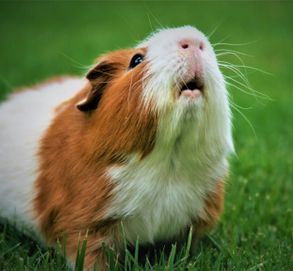
Respiratory infections are fairly common in guinea pigs. Immunosuppression from stress, crowding, or vitamin C deficiency makes them more prone to respiratory issues. Common infectious causes include Bordetella bronchiseptica that is carried by rabbits, Streptococcus pneumonia, or guinea pig Adenovirus.
Symptoms include wheezing, respiratory clicking, sneezing, ocular and/or nasal discharge, difficulty breathing, rapid breathing, lethargy, fever, red and swollen eyes, inappetence to anorexia, and rarely acute death. Guinea pigs are obligate nasal breathers, so even upper respiratory infections can cause them to have difficulty breathing. They can have concurrent vestibular signs which includes head tilts and rolling to one side if the infection has extended into the middle and inner ear.
Similar symptoms are seen in guinea pigs suffering from allergies secondary to fragrant bedding, ammonia build-up in soiled bedding, or inappropriate ventilation. Nasal obstruction due to a tumor, foreign body, or tooth root abscess can also often look very similar to a respiratory infection.
Often your veterinarian will elect to treat based on clinical signs. In more severe cases or cases that don’t seem to be responding to treatment they may recommend radiographs or bacterial culture.
Treatment of respiratory infections in guinea pigs requires prescription antibiotics and vitamin C supplementation. Your veterinarian may also prescribe eye drops, non-steroidal anti-inflammatories, or nebulization with saline depending on your pet’s needs. Supportive care is always important in treating guinea pigs in the form in subcutaneous fluid administration and assist feeding. Patients who are really struggling to breathe may require hospitalization on oxygen until things improve.
The prognosis is good to guarded depending on the location of the infection, the severity of signs, and whether the patient is eating on their own. Upper respiratory infections typically have a good to fair prognosis while lower respiratory infections such as pneumonia are more guarded. Occasionally resistant infections or other underlying health problems delay or prevent resolution with initial treatment.
We recommend a recheck examination if worsening, if not improving in 3-5 days, or at the end of treatment to make sure problems have resolved.
Copyright © All Rights Reserved
